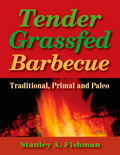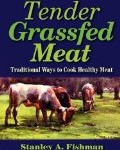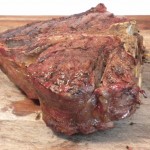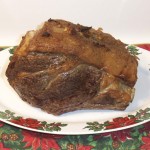Thai Coffee, No Sugar, Real Cream
By Stanley A. Fishman, author of Tender Grassfed Meat and Tender Grassfed Barbecue
Some years ago, my wife and I had a favorite Thai Restaurant, and we really enjoyed their Thai coffee, a very cold, sweet, and flavorful drink, very refreshing and tasty. Nothing like it on a hot day.
The restaurant closed, we discovered real food, and we just stopped having Thai coffee. A couple of Thai restaurants opened in our area, and we remembered how much we liked the previous one, so we decided to try them out. We were delighted to see that the first restaurant had Thai coffee. But being committed to real food, we had to ask if it had sugar or any other sweetener. “Lots of sugar,†said the waitress. We had given up eating refined sugar a long time ago, so this coffee was out.
The second restaurant also had Thai coffee on the menu. When we asked about sweeteners, once again we heard that there was lots of sugar.
We wanted Thai coffee! But not the sugar.
So I checked out my library of cookbooks, and found three books on Thai cooking. Two of them had recipes for Thai coffee. Interestingly enough, neither recipe added sugar, but both depended heavily on canned evaporated milk. No way to know where the milk came from, or what the cows were fed or given, or what cooking and canning milk would do to its nutritional qualities.
But we still wanted Thai coffee! So what could we do? Invent our own version, of course. We decided to leave out all sweeteners and substitute cream, real, heavy cream from a good organic dairy for the evaporated milk. The recipe was very simple, and very delicious. It did not taste like our memory of Thai coffee, not exactly, but it was very good, creamy, cold, and just delicious. And very refreshing. The recipe is simplicity itself.
Simple Thai Coffee for Two
Chill a pint of strong coffee in the refrigerator.
For each serving, fill a tall glass about seven-eighths full of shaved ice, (or ice crushed in a blender), preferably made from filtered water.
Add enough coffee to the ice until the glass is three-quarters full of coffee.
Add enough fresh, rich, heavy, organic cream to fill up the glass. Mix well with a spoon.
Serve and enjoy.
Food Can Cure
By Stanley A. Fishman, author of Tender Grassfed Meat and Tender Grassfed Barbecue
What do scurvy, rickets, pellagra, and beriberi have in common?
- They are all deadly illnesses that once ravaged humanity.
- They have been eradicated in most of the world.
- They can be easily cured.
- They are not cured with drugs. They are not cured with surgery. They are not cured with radiation.
They are cured with food. Or, in some cases, with substances found in food that can be artificially made.
How Food Cures Work
The process for how food cures these illnesses is basically the same. A nutritional deficiency is corrected, and the body uses the needed nutrients to heal itself.
Scurvy is a perfect example of how the process works. It was identified in ancient times, and caused its victims to become lethargic, fatigued, and unable to function. As the disease advanced, teeth fell out, and the victim could actually die.
This illness was most common for sailors undertaking long voyages, where they spent much of the voyage eating only salted meat and biscuits. It could also be common in winter, when there was no fresh food in some areas.
It was discovered in 1932 that the illness was caused by a lack of Vitamin C. Our ancestors could not identify vitamins, but they learned to provide sailors with the juice of citrus fruits like lemons and limes during voyages, which prevented the problem. Many of our ancestors solved the problem of no fresh food in winter by regularly eating fermented vegetables, like sauerkraut, which contain ample Vitamin C.
In fact, the famous explorer Captain Cook, who undertook the longest known voyages in the era of sail, exploring much of the vast Pacific, carried barrels of sauerkraut on all of his ships, which prevented scurvy, and lasted for years, even in the tropics.
There are many such diseases, where a nutritional deficiency is the cause, and correcting the deficiency through food is the cure.
Since the information we have about nutrition and illness is incomplete, I wonder how many current diseases could be successfully treated by this age old method of correcting nutritional deficiencies.
Yet I have heard many reports of individuals who have healed themselves of all kinds of illnesses, including many that have been called incurable, by the use of food.
I think humanity would be much better off, if qualified scientists were to actually research whether many of the diseases that modern medicine cannot cure are in fact caused by a nutritional deficiency, and how that deficiency could be corrected.
The healthy peoples studied by Dr. Weston A. Price, who were so healthy that they had no disease of any kind, kept themselves healthy by following the traditional diet of their ancestors. They had no medical care, or drugs, or surgery. Yet they were healthy, much healthier than the American people. We have much to learn from this, and I hope that science will put far more resources into researching this matter.
Disclaimer: Information found on the Tender Grassfed Meat site, including this article, is meant for educational and informational purposes only. Any statements or claims about the possible health benefits conferred by any foods or anything else have not been evaluated by the Food & Drug Administration and are not intended to diagnose, treat, cure, or prevent any disease. None of the content on the Tender Grassfed Meat site should be relied upon for any purpose, and nothing here is a substitute for a medical diagnosis or medical treatment.
This post is part of Fat Tuesday blog carnival.
When It Comes to Nutrition, We Are All Individuals
By Stanley A. Fishman, author of Tender Grassfed Meat and Tender Grassfed Barbecue

This delicious potato dish will be enjoyed by most, but not by people who are allergic to nightshades.
When it comes to nutritional advice, we are treated as if we are all the same person, with the exact same nutritional needs. Doctors and nutritionists give the same recommendations for what everyone should eat at a certain age.
Individual nutritional needs of the person are ignored, and never considered. The standard is the same for everyone of a certain age group.
Yet the truth of the matter is that each of us is a unique individual, of different sizes, body composition, body chemistry, genes, and many other factors that make each of us unique.
The “one size fits all†approach taken by the medical profession and conventional nutritionists does not really fit anyone.
The Wisdom of Hippocrates
Hippocrates of Kos, the most famous doctor of ancient times, lived well over two thousand years ago. Yet his approach to treating his patients was totally different from the one-size-fits-all approach, and makes a lot more sense.
Hippocrates treated each of his patients as a unique individual, getting to know them. His treatment of choice was diet, which mainly consisted of finding out what foods the patient needed, and providing them. He paid careful attention to how the individual patient responded to the foods he prescribed, and if the desired results were not obtained, he tried something else, either other foods, or rest, or a particular exercise, or any combination of the above. Drugs and surgery were used only as a last resort. Hippocrates was famous for healing most of his patients, and even stopped a plague that was devastating Athens.
The same principle applies to nutrition and natural remedies. What works for one person may not work for another, or may even harm them. In fact, since our nutritional needs often change, what worked at one time may not help another time. The very same food or herbal remedy that heals one person may be useless for another person. This is because our nutritional needs, while very similar to those of other people, are never identical, and often change.
For example, some people are allergic to members of the nightshade family of plants, such as potatoes, and other people thrive on them.
So How Do We Know What to Eat?
Nature has given us the senses we need to determine this. Our senses of taste, smell, sight, and our intuition can tell us what is good for us to eat at a particular time. The healthy peoples studied by Dr. Weston A. Price understood this principle, and had developed a traditional cuisine over the centuries that kept them so healthy that they had no disease, and no need for medical care. Being of a similar heritage and ancestry, the foods that their ancestors ate helped them thrive. Yet even among these so-called primitives, individuals would vary their diet depending on the needs of the moment. They might stop eating a particular food that did not appeal to them at the time, or seek out a particular food that they craved. These patterns were noticed and remembered by these peoples, who would make special foods available to individuals at a certain time, such as recovering from a physical injury, or being pregnant, or wanting to conceive, or many other circumstances.
This is much harder to do in modern society, where food has been industrialized and changed by chemical processing and the use of flavor enhancers. Our senses often cannot tell what industrial foods are good or bad for us, or how much to eat, or how to get particular nutrients.
The solution I have found for myself, is simple.
Just eat real food, as said by Sean Croxton. Our bodies know how to sense and deal with the foods of nature.
Pay attention to how a food smells, tastes, and to your cravings for a particular real food. I find that following my senses and cravings is the best way I have found to know what to eat, and how much.
This only works with real food. The better a particular real food tastes, the better I feel it is for me to eat it at that particular time. And if a food does not appeal to me, or tastes bad, I stop eating it. Often a food that tasted wonderful at the beginning of a meal will not taste as good after I have eaten some of it. This is my body telling me that I have had enough. Our bodies know what we need and how to get it from real food.
Disclaimer: Information found on the Tender Grassfed Meat site, including this article, is meant for educational and informational purposes only. Any statements or claims about the possible health benefits conferred by any foods or anything else have not been evaluated by the Food & Drug Administration and are not intended to diagnose, treat, cure, or prevent any disease. None of the content on the Tender Grassfed Meat site should be relied upon for any purpose, and nothing here is a substitute for a medical diagnosis or medical treatment.


 Photos of recipes from the new book Tender Grassfed Barbecue
Photos of recipes from the new book Tender Grassfed Barbecue
 Photos of recipes from the cookbook Tender Grassfed Meat
Photos of recipes from the cookbook Tender Grassfed Meat

